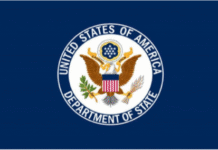
-
Health cards launched for free lifelong treatment of July uprising victims
-
Focus on injured fighters’ mental, social rehabilitation
-
Over 1,000 treated; 21 amputations; some patients to get foreign care
Chief Adviser Muhammad Yunus today (1 January) said there is no reason to worry about the financial security of the families of the martyrs and the injured in the students-people’s uprising.
“It is the responsibility of the state to ensure medical care for the wounded fighters. We will do that. The government will ensure their financial security,” he said while inaugurating the distribution of health cards for them at the State Guest House Jamuna.
Yunus said having this health card means that cardholders will get treatment at any government hospital in the country at any time, be it after a year or two. “This card will always be there.”
In addition to this, he said, they have to think about the mental and social rehabilitation of the fighters injured in July.
“This needs to be given importance. Appropriate initiatives need to be taken so that these people can live their lives happily and be established in society,” said the Chief Adviser.
He also said the path must be paved step by step so that those who are interested can do that work with joy. “In addition to healing physically through treatment, attention must also be paid to their mental health,” Dr Yunus said.
Health Adviser Nurjahan Begum, Special Assistant to the chief advisor at the Ministry of Health and Family Welfare Prof Dr Md Sayedur Rahman, Information Adviser Nahid Islam, Health Secretary Md Sayedur Rahman and July Shaheed Smriti Foundation Chief Executive Mir Mahbubur Rahman Snigdha and Secretary Sarjis Alam were, among others, present.
The chief adviser inaugurated the health card distribution programme to ensure free medical services to the fighters injured in the July uprising in all government hospitals across the country.
He handed over health cards to two students injured in the uprising. These two fighters of the uprising are Ifat Hossain, a student of Narsingdi United College, and Israt Jahan Imu, a student of the Disaster Management Department of Dhaka University.
Ifat lost the sight of both eyes in police firing in Narsingdi during the July 19 movement last year who still cannot see in one eye, according to chief adviser’s press wing.
On the other hand, Israt, who was seriously injured in the banned Chhatra League attack on female students in the Dhaka University area on 15 July, is currently undergoing treatment at BSMMU.
The chief adviser spoke to both of them and inquired about medical services and other issues.
The health ministry said health cards will be distributed to specific districts every week among the fighters injured in the July uprising.
National Institute of Ophthalmology Director Prof Khair Ahmed Chowdhury informed the chief adviser about the medical activities.
So far, he said, 1,074 people have received treatment at the Institute of Ophthalmology. Of them, 39 have lost both eyes permanently. About 450 have one eye damaged.
Chowdhury also said about 650 operations have been performed for eye injuries. Of these, more than 300 retina surgeries were performed in the second phase.
Around 60 patients were operated on in two hospitals outside the Institute of Ophthalmology. Some patients also need operations in the third phase, he said.
Chowdhury said doctors from China, France, Nepal, and the United States have visited the Institute of Ophthalmology so far and the doctors have expressed satisfaction with the treatment being provided.
He also said that 65 patients have recovered their eyesight at the Institute of Ophthalmology so far.
National Institute of Traumatology and Orthopaedic Rehabilitation (NITOR) Director Dr Md Abul Kenan informed the Chief Adviser about the progress of his hospital’s treatment.
So far, 21 patients have had to have their hands or feet amputated in their hospital. Some patients have been selected to be taken abroad, he said.
According to him, most of the patients undergoing treatment will gradually recover and none of them are at risk of death.









